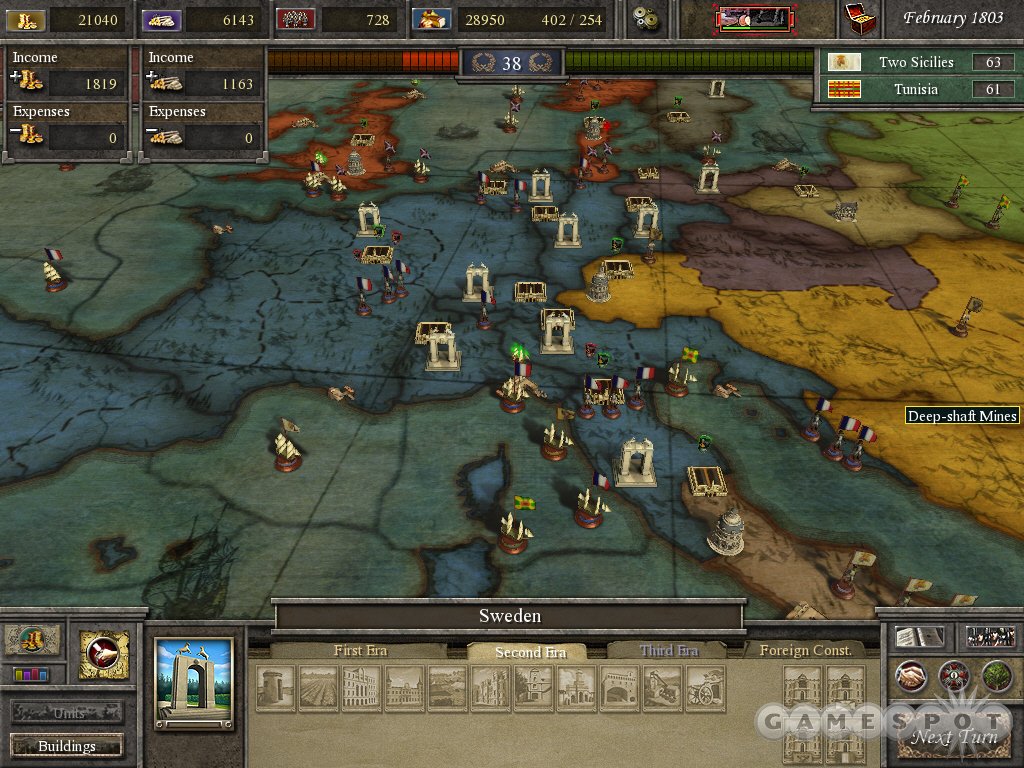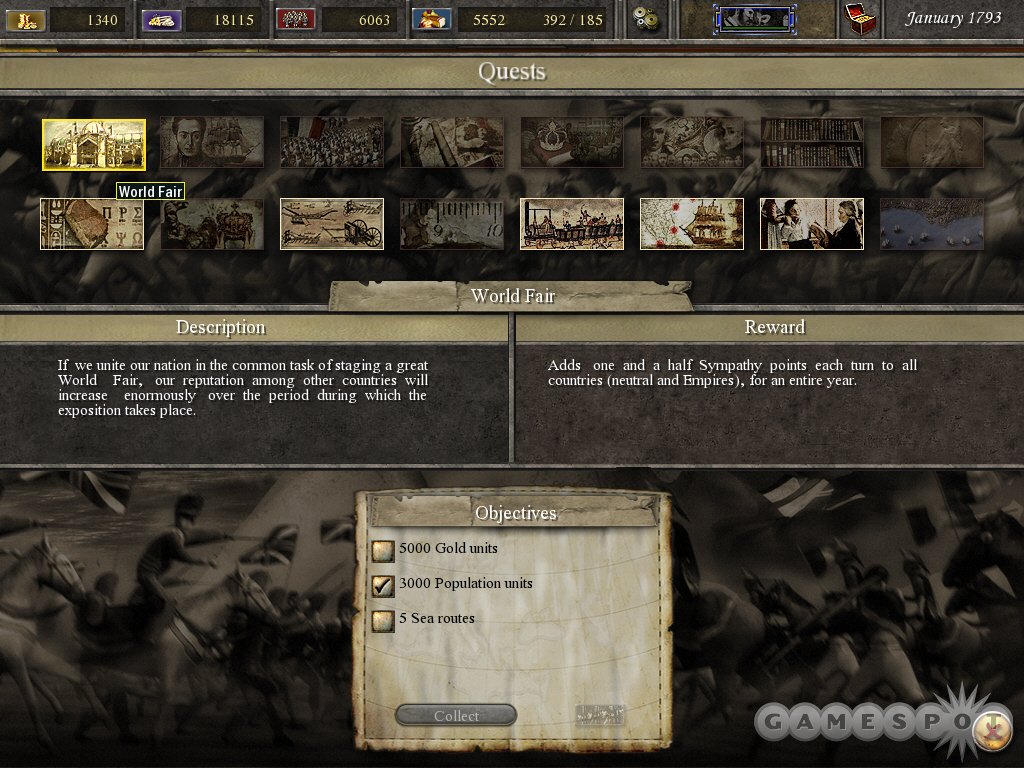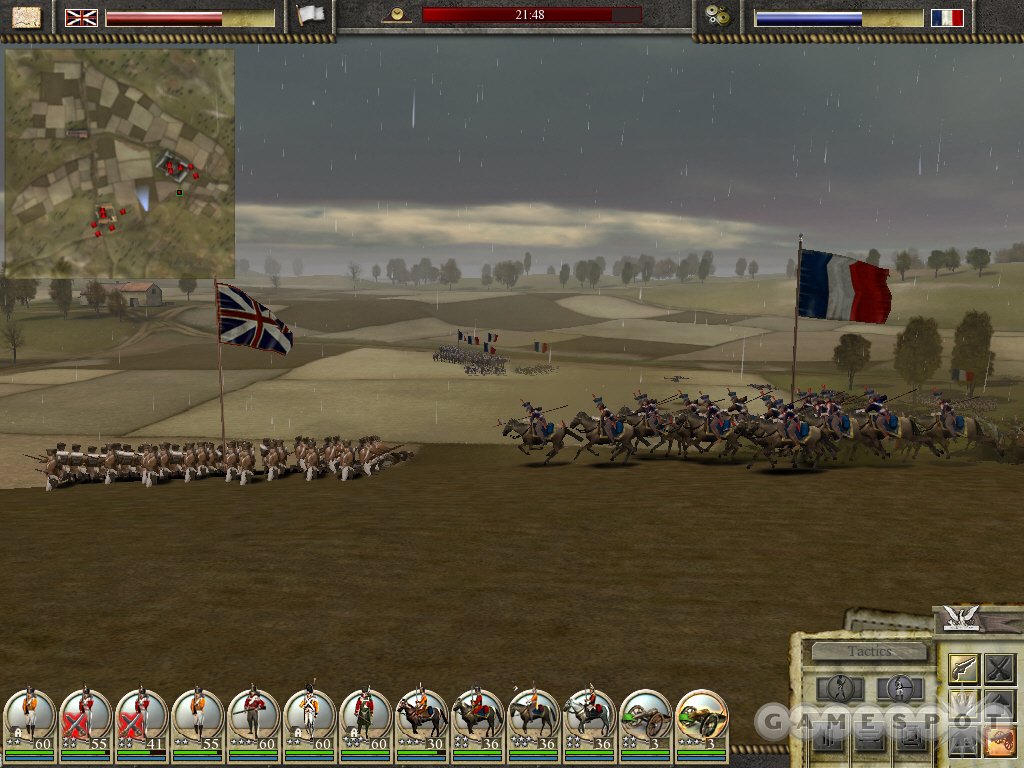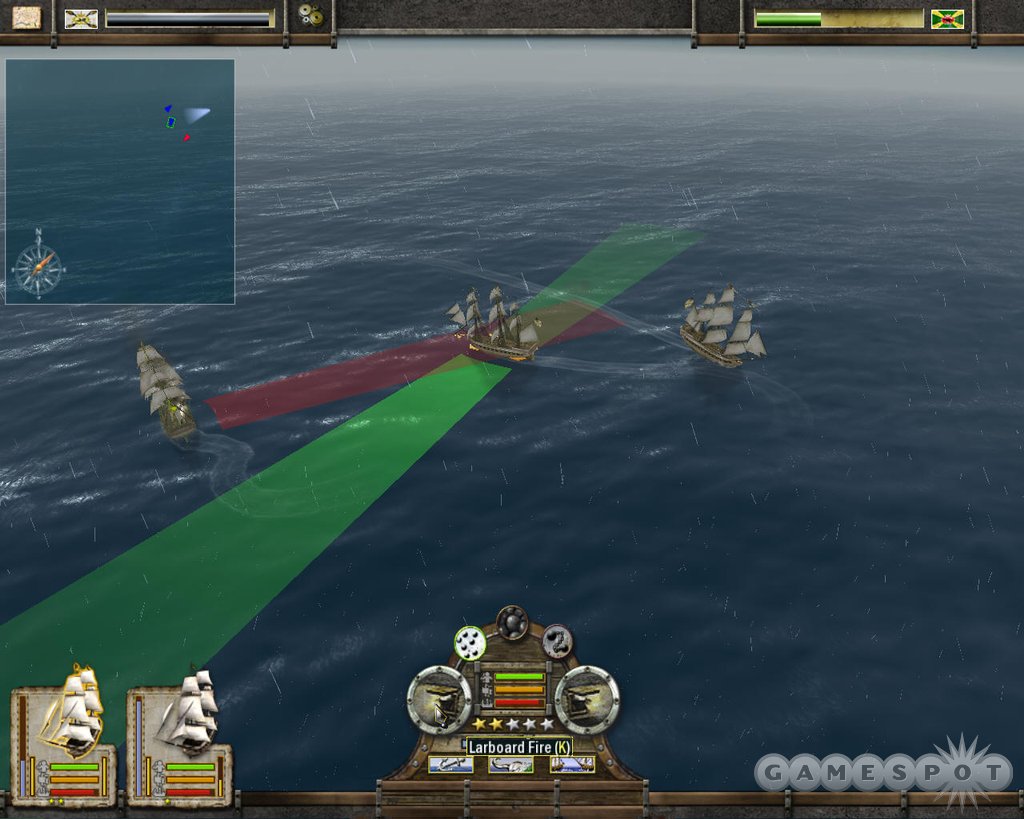Imperial Glory is a game that wants to be the next Total War. Not that there's anything wrong with that. After all, Creative Assembly's popular strategy franchise has gotten bigger and better with every release. However, in copying the formula of Total War, Pyro Studios, the designers of Imperial Glory, have missed the small nuances and details that made the Total War games, in particular Medieval and Rome, something special. That leaves Imperial Glory feeling very much like an uneven first step, which is a pity, because it does have a lot of promise.

In Imperial Glory, you can control one of the five principal European powers of the Napoleonic Wars: France, the United Kingdom, Prussia, Austria, and Russia. While there are about a dozen other minor countries in the game, such as Portugal and Denmark, you aren't able to play as them. However, you can assimilate them into your empire, through conquest or peaceful integration, and that's pretty much what you'll spend much of the game doing as you attempt to conquer Europe nation by nation. Following the Total War formula means that you spend a lot of time on a strategic, turn-based map that looks a bit like the board game Risk. And when armies meet, you have the option of letting the computer automatically calculate the results, or you can drop down into a real-time, 3D battlefield and control your various infantry, artillery, and cavalry battalions on the map. Imperial Glory also goes one better than Total War by including naval battles, so you can take your sloops and frigates into action.
That all sounds good, but in practice it turns out that Imperial Glory finds itself lacking in many departments. The turn-based strategy section is perhaps the best part of the game, and it can be an enjoyable, although very slow-paced, affair. Your challenges will vary, depending on the nation you choose to play as. France perhaps has the easiest road to travel, whereas Prussia and Austria find themselves surrounded on three sides by three very menacing empires. The United Kingdom, on the other hand, can afford to sit back safely behind the Royal Navy, though it has trouble generating the production and population that the other empires can. Russia is huge, but it's stuck on the outskirts of Europe.
As a strategy game, Imperial Glory, for the most part, captures the diplomatic balancing act that was the Napoleonic Wars. In order not to be swept into the dustbin of history by its neighbors, nations formed varying coalitions to try to stave off this threat (namely France). And this is something that you'll spend a lot of time doing, thanks to the full-featured diplomatic system that lets you grant rights of passage, loan armies, form defensive alliances as well as coalitions, and even marry off a prospective heir to another heir to improve relations. However, the peaceful route can be a bit frustrating, as you can easily spend years and thousands of resources to improve relations with a country to the point that it's almost ready to join your empire, only to see a rival empire simply invade and take it over. This makes diplomacy a fairly weak option in the game, as it's far less effective than simple force.
There are four resources in the game: gold, production, population, and food, and each province in the game is capable of generating a certain amount of each resource. A province's resource production can be enhanced by researching new technologies and building new structures (or, in the case of gold, creating land and sea trade routes). Still, when you get down to it, you'll eventually face a bottleneck in a certain resource. The easiest way to solve this, though, is through expanding your empire.

Imperial Glory also introduces an interesting quest system, which is sort of like the great wonders found in Civilization. Your nation can lay claim to some of the great achievements of the era, such as unearthing the Rosetta stone and building the first major railroad network, by fulfilling a list of prerequisites. For example, the quest for the Rosetta stone will require you to establish a sea link to Alexandria, as well as to commit several light infantry units and warships. However, if you manage to do the quest first, you get a boost in your technological research, reflecting the burst of scientific knowledge that resulted in that important artifact being discovered. However, the game lacks other features that are found in other strategy games. For instance, there are no random events to shake things up a bit, nor do there seem to be any efforts to take the rest of the world into account. The result is that, once the alliance system locks into place, not a lot happens over long stretches of the game.
Unfortunately, the real-time battles are one of the game's biggest weaknesses. This is a pity, since they could have been a great strength, especially considering how Napoleonic-era tactics lend themselves well to the 3D engine. First of all, you never really get a true sense of epic scale, as what are supposed to be battalions and regiments look like companies on the screen. Hence, what should be titanic battles with up to six armies on the screen instead feel like small skirmishes. This is especially disappointing, as the latest Total War game had no trouble in putting thousands, and even tens of thousands, of men onscreen at a time.

However, the battle system's biggest problem is that it doesn't model morale. This means that your men basically turn into mindless automatons, and not very smart ones, either. You'll see battalions literally stand their ground as they're annihilated, and they won't even panic if flanked on both sides. They'll take withering losses and won't blink. This takes the realism out of the battles. Even worse, it negates things that should be assets. For example, you'll obtain lots of resources building up expensive artillery, only to see the artillery pieces easily wiped out by a charge of suicidal cavalry. And one of the purposes of artillery is to shatter the other side's unit cohesion and will to fight, but that is lost in the game, as well.
Naval battles don't fare well, either. In general, the ideas behind naval combat are great. Taking the wind into mind, you must maneuver your wooden ships to best fire broadside upon the enemy. These broadside attacks can range from regular cannonballs, grapeshots to shred enemy sailors, and chain shots to shred enemy sails. While one-on-one battles are fairly straightforward, trying to coordinate two or more ships in combat against two or more enemy ships gets to be even more complicated and difficult. Basically, you just have too much to manage on your hands. It doesn't help that the camera is finicky and that it's far too easy to lose your orientation because the wind is causing the camera to spin around. Nor does it help that the oceanic battlefields feel small, which means that it's easy to have a ship sail off the battlefield, resulting in its loss. This doesn't make sense after all, because unless you're near land or shoals, the sea is a relatively open space.
It's too bad that the battles don't come together well, because they otherwise look fabulous. The battlefields on land are simply beautiful, and they capture the diversity of terrain that can be found in Europe, from the foreboding German woods to pastoral Spanish farmland, and more. There are also picturesque farmhouses and other buildings that you can barricade infantry in for a defensive and line-of-sight advantage. It almost feels like a painting, at times. The units and unit animations could be a lot better, though, and they sometimes feel a bit crude in comparison to the background. Still, it's very cool from a distance, especially when you see the smoke bursts from canon and gunfire, as well as formations lining up and exchanging fire.

Beyond the campaign game, Imperial Glory ships with a meager five historical battles that you can play from either side. This is a fairly small number, but at least the major battles, such as Waterloo and Austerlitz, are accounted for. In terms of multiplayer, Imperial Glory only limits you to real-time battles. You can't play the turn-based campaign in multiplayer, which is probably due to the huge amount of time that it would require. You can play naval and land battles, as well as the historical battles in multiplayer.
Imperial Glory feels very much like Shogun: Total War did when it came out. In other words, it shows a lot of untapped promise and potential, but it also possesses raw edges and missed opportunities. This is still an enjoyable game, though, so long as you're willing to overlook the flaws.